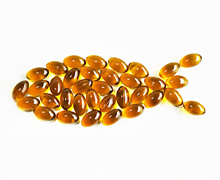
Children diagnosed with Attention Deficit Hyperactivity Disorder (ADHD) may benefit from eating more wild-caught fatty fish or taking fish oil supplements because scientists have discovered omega-3 fatty acids are as effective as prescription drugs when it comes to attention issues for children with low levels of omega-3.
Researchers from King’s College in London and China Medical University in Taiwan had their report published in the journal Translational Psychiatry. They said their findings show there is room for a personalized medical approach to psychiatry based on the fact omega-3 supplementation works for some children. These same researchers previously discovered children with an omega-3 deficiency are more likely to have more severe ADHD symptoms.
A total of 92 children between the ages of 6-18 with ADHD took part in the randomized, controlled trial. They were given either high doses of the omega-3 fatty acid EPA (eicosapentaenoic acid) or a placebo for 12 weeks. The children with the lowest levels of EPA in their blood showed significant improvement in what researchers called “focused attention” and “vigilance” after taking the omega-3 supplements. The same improvements were not observed in children with normal or high levels of EPA. In fact, children who started with high levels of EPA had negative effects regarding impulsivity from omega-3 supplementation.
Researchers said the results of other studies have been inconsistent regarding omega-3 supplementation and parents should consult with medical professionals before giving their children omega-3 supplements. But, among the children with an omega-3 deficiency in this study, the improvements in attention and vigilance were greater with supplementation than the drug methylphenidate.
“Our results suggest that fish oil supplements are at least as effective for attention as conventional pharmacological treatments among those children with ADHD who have omega-3 deficiency,” said Dr. Jane Chang from King’s College. “On the other hand, it is possible to have too much of a good thing, and parents should always consult with their children's psychiatrists since our study suggests there could be negative effects for some children.”
Professor Carmine Pariante from King's College said, “The omega-3 supplements only worked in children that had lower levels of EPA in their blood, as if the intervention was replenishing a lack of this important nutrient. For those children with omega-3 deficiency, fish oil supplements could be a preferable option to standard stimulant treatments. Our study sets an important precedent for other nutritional interventions, and we can start bringing the benefits of 'personalized psychiatry' to children with ADHD.”
The study was conducted in Taiwan where the standard diet contains more fish than Europe and North America. Researchers said ADHD studies in Western countries typically have participants with lower EPA blood levels than in this study.
“High blood-levels of EPA without using supplements can be achieved through a good diet with plenty of fish, which is common in some Asian countries like Taiwan and Japan,” said professor Kuan-Pin Su from China Medical University. “It is possible that EPA deficiency is more common among children with ADHD in countries with less fish consumption, such as in North America and many countries in Europe, and that fish oil supplementation could therefore have more widespread benefits for treating the condition than in our study.”
The children in this study were only given one form of omega-3 essential fatty acid (EPA). Research shows the combination of EPA and DHA (docosahexaenoic acid) provide a good balance and work well together.
Click here to read more in the journal Translational Psychiatry.
